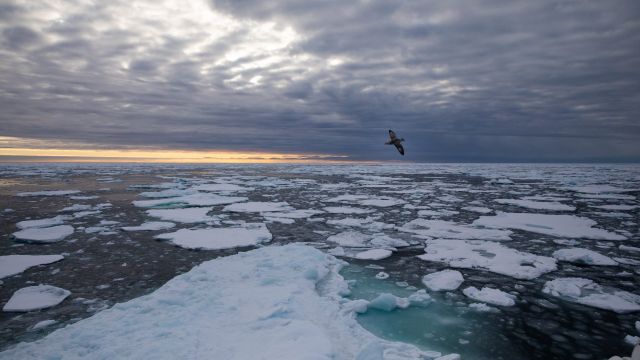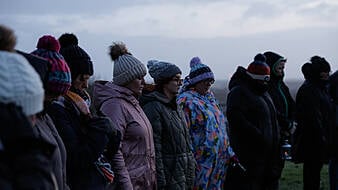The extent of the sea ice in the Arctic at what is thought to be the end of the annual summer melt was 1.44 million square miles (3.74 million square kilometres), the National Snow and Ice Data Centre (NSIDC) in the US said.
It is the second lowest minimum extent of sea ice cover at the end of the summer in a nearly 42-year satellite record, with only 2012 seeing ice cover falling to a lower minimum before ice refreezes in the autumn.
“The year 2020 will stand as an exclamation point on the downward trend in Arctic sea ice extent. We are headed towards a seasonally ice-free Arctic Ocean and this year is another nail in the coffin.” We've called the likely #Arctic sea ice minimum extent: https://t.co/xfjgaJCPSZ pic.twitter.com/t5DBMJ5o5e
— National Snow and Ice Data Center (@NSIDC) September 21, 2020
This year is only the second time that the minimum summer sea ice extent has fallen below four million square kilometres since satellite monitoring began in 1979, the scientists said.
Mark Serreze, director of NSIDC, said: “It’s been a crazy year up north, with sea ice at a near-record low, 100-degree (Fahrenheit) heat waves in Siberia, and massive forest fires.
“The year 2020 will stand as an exclamation point on the downward trend in Arctic sea ice extent.
“We are headed towards a seasonally ice-free Arctic Ocean, and this year is another nail in the coffin.”
We have called this year's likely #Arctic sea ice minimum extent at 3.74 M sq km (1.44 M sq mi) on September 15. This year's minimum extent is ranked 2nd lowest in the satellite record. Learn more: https://t.co/xfjgaJUqKx. #CUBoulder @CIRES_News @NASA_Earth @NASA_Ice pic.twitter.com/ndPwIeGPSh
— National Snow and Ice Data Center (@NSIDC) September 21, 2020
Advertisement
Ed Blockley, Met Office scientific manager for polar climate, said: “September 2020 is now the second time in the modern record that the extent of Arctic sea ice has dropped below four million square kilometres.
“This threshold has been crossed because this summer has seen several periods of very rapid sea ice loss linked, in part, to the record-breaking heatwave in Siberia.
“The Arctic is one of the most vulnerable regions on Earth to climate change and warming here will have consequences both for the region and the planet as a whole.”
The news prompted calls from environmental campaigners for rapid action to curb climate greenhouse gas emissions and protect the oceans.
The UK is the Arctic’s closest neighbour and these extreme events affect us all, from changes in weather to increasing sea levels
Rod Downie, chief polar adviser at WWF, said the Arctic was in “meltdown”.
“The loss of sea ice alongside raging forest fires in Siberia and the melting of the Greenland ice sheet are amongst the most visible and dramatic signs of the climate crisis we face.
“That has profound implications for the iconic species of the ice, from walrus to polar bears, and for the people who call the Arctic home. ”
And he warned that “what happens in the Arctic doesn’t stay in the Arctic”.
“The UK is the Arctic’s closest neighbour and these extreme events affect us all, from changes in weather to increasing sea levels,” he added.
He said the UK Government needed to drastically and urgently raise its ambition on tackling climate change to show global leadership at key UN “Cop26” talks in Glasgow next year.
We need to hit the reset button right now on how we look after each other and our planet by protecting at least 30% of our oceans by 2030
Speaking from the edge of the sea ice, on board the Greenpeace Ship Arctic Sunrise, Greenpeace campaigner Laura Meller said: “The rapid disappearance of sea ice is a sobering indicator of how closely our planet is circling the drain.
“As the Arctic melts, the ocean will absorb more heat, and all of us will be more exposed to the devastating effects of climate breakdown.”
She said the Arctic ice cap is a frozen ocean in urgent need of protection.
“We need to hit the reset button right now on how we look after each other and our planet by protecting at least 30% of our oceans by 2030 to help our planet cope with the climate breakdown.”







